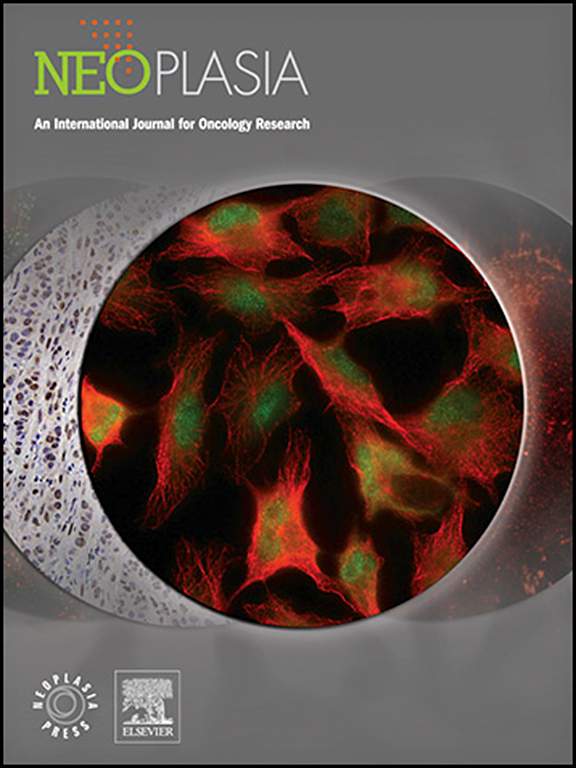去泛素酶USP7稳定HER2表达并促进乳腺癌进展
IF 7.7
2区 医学
Q1 Biochemistry, Genetics and Molecular Biology
引用次数: 0
摘要
HER2的过表达和扩增发生在乳腺癌中。然而,HER2在肿瘤中的作用机制尚未阐明。HER2可以被UPS系统降解,并且已经确定了几种HER2相关的e3,但HER2的DUB尚未发现。针对HER2的靶向治疗在HER2阳性乳腺癌患者中取得了令人印象深刻的疗效。本研究通过MTS、Western blot、Co-IP、集落形成、RT-qPCR、EdU、流式细胞术、免疫荧光和异种移植模型等方法,阐明了USP7缺失通过降低HER2蛋白丰度来抑制HER2阳性乳腺癌细胞的生长。我们发现USP7在HER2阳性乳腺癌中高表达,且USP7与HER2的表达呈正相关。USP7过表达加速细胞周期进程。机制上,USP7与HER2相互作用并降低HER2泛素化以稳定其表达。此外,在体内和体外,USP7敲低抑制肿瘤生长。此外,HER2过表达部分逆转了USP7抑制诱导的细胞生长抑制。临床样本分析显示,HER2+乳腺癌患者的USP7过表达与预后不良相关。因此,本研究揭示了USP7作为HER2的DUB,可能是HER2+乳腺癌患者的潜在治疗靶点。本文章由计算机程序翻译,如有差异,请以英文原文为准。
The deubiquitinase USP7 stabilizes HER2 expression and promotes breast cancer progression
The overexpression and amplification of HER2 occurs in breast cancer. However, the mechanism of HER2 action in tumor has not yet been elucidated. HER2 can be degraded by the UPS system, and several HER2-associated E3s have been identified, but the DUB for HER2 has not yet been uncovered. Targeted therapy against HER2 has achieved impressive efficacy in patients with HER2-positive breast cancer. Herein, using MTS, Western blot, Co-IP, colony formation, RT‒qPCR, EdU, flow cytometry, immunofluorescence assays and xenograft model, we elucidated that USP7 deletion inhibited the growth of HER2-positive breast cancer cell by decreasing HER2 protein abundance. We found that USP7 was highly expressed in HER2-positive breast cancer and the expression of USP7 and HER2 was positively correlated. USP7 overexpression accelerated cell cycle progression. Mechanistically, USP7 interacted with HER2 and decreased HER2 ubiquitination to stabilize its expression. Moreover, USP7 knockdown inhibited tumor growth in vivo and in vitro. In addition, HER2 overexpression partially reversed cell growth inhibition induced by USP7 inhibition. Analyses of clinical samples revealed that USP7 overexpression was associated with poor prognosis in patients with HER2+ breast cancer. Thus, this study revealed that USP7, as a DUB of HER2, may be a potential therapeutic target for patient with HER2+ breast cancer.
求助全文
通过发布文献求助,成功后即可免费获取论文全文。
去求助
来源期刊

Neoplasia
医学-肿瘤学
CiteScore
9.20
自引率
2.10%
发文量
82
审稿时长
26 days
期刊介绍:
Neoplasia publishes the results of novel investigations in all areas of oncology research. The title Neoplasia was chosen to convey the journal’s breadth, which encompasses the traditional disciplines of cancer research as well as emerging fields and interdisciplinary investigations. Neoplasia is interested in studies describing new molecular and genetic findings relating to the neoplastic phenotype and in laboratory and clinical studies demonstrating creative applications of advances in the basic sciences to risk assessment, prognostic indications, detection, diagnosis, and treatment. In addition to regular Research Reports, Neoplasia also publishes Reviews and Meeting Reports. Neoplasia is committed to ensuring a thorough, fair, and rapid review and publication schedule to further its mission of serving both the scientific and clinical communities by disseminating important data and ideas in cancer research.
 求助内容:
求助内容: 应助结果提醒方式:
应助结果提醒方式:


